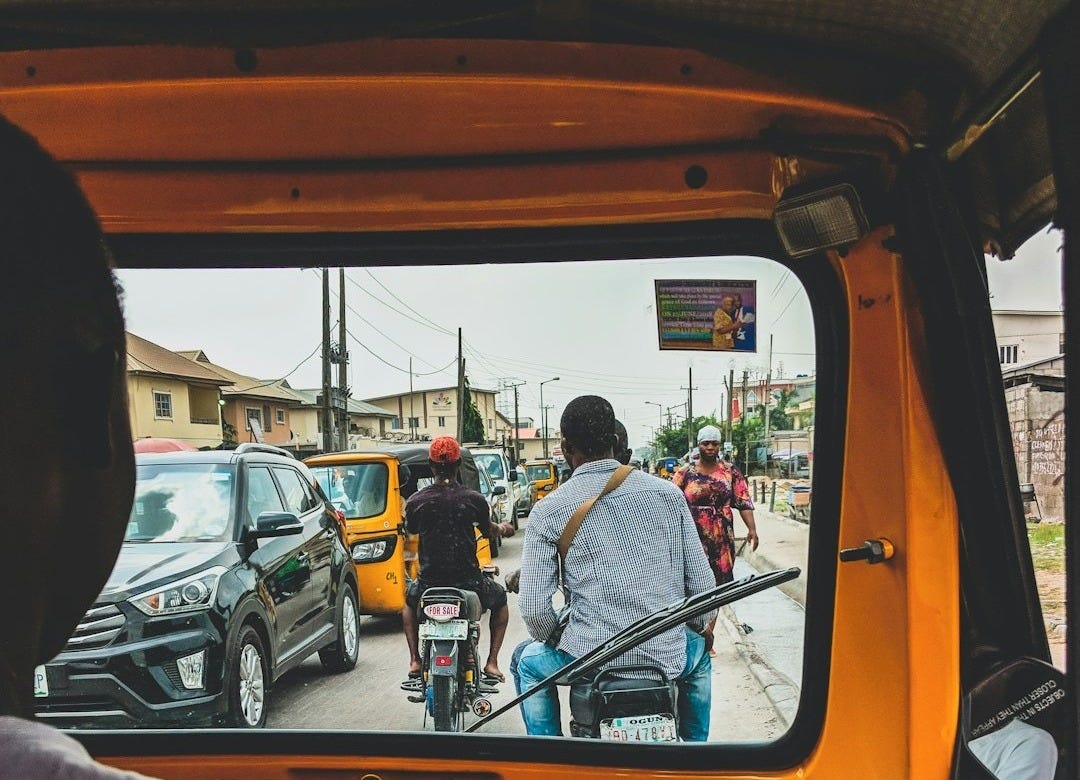Be Drug or Let Go
A Lagos taxi, a goat in a trunk, and a lesson in letting go.

By the time my back was soaked in sweat and the baking sun mixed with Lagos pollution to coax out the baked petrochemical smell of the faux fur lining the taxi’s dashboard, I knew we weren’t making the meeting on time. The meeting I’d built up in my head like it was a summit on peace and grain. The air conditioner probably stopped working three crashes ago, but the windows stayed up—better to bake than have a moto thief snatch your phone. The hotter the country, the furrier the dashboard. No one knows why. Cold countries never bother. It makes no sense. Then again, after three months in Nigeria, I’d nearly stopped believing in my ability to make sense of anything.
We’d inched along for an hour. I thought it mattered—being on time. It’s hard to let go of the sweet narcotic of feeling important. I was embedded with the minister for agricultural reform. Systems change. Capital letters. Big vision. I was supposed to be convincing the big businessmen of Nigeria—Ogas, gatekeepers to reform or stagnation, with a fondness for being thanked before they’ve done anything. Instead, I was stuck in traffic, marinating in sweat, gripping a PowerPoint like it was scripture.
My sense of self-importance rose with my temperature and attacked any hope of patience. The American instinct to do something—anything—could no longer be restrained. With the one flickering bar of Wi-Fi on one of the three phones you needed just to stay connected, I started offering helpful suggestions from Google Maps. Alternate routes. All while sitting in the middle of a bridge lacking off-ramps. Its futility was obvious, but few things soothe panic like a pretend sense of agency.
The driver endured my “help” for ten minutes, then gripped the wheel and let out a groan like a man setting down a boulder. He turned off the car—three inches of progress to be made be damned—and, ignoring the honking, turned to raise his crooked finger at me.
“Madame! This is L-A-G-O-S, NIGERIA.” His nostrils flared, and the finger moved from me toward the heavens, as if calling on the Almighty to bear witness. “You have exactly and only two options—be drug or let go! Now which do you choose?”
His staccato English didn’t fully make sense, but the sentiment was clear.
“Um, let go, I guess,” I replied.
The driver waved his finger an inch from my nose. “Ah ha! Yes! Only thing to do!”
He turned the car back on. The traffic stayed still. But something in me did, in fact, let go.
Now free from my delusion of control and resigned to my fate, I turned to the window and watched a city with its own rules. Six jumbled lanes of traffic crowded a road built for three. Every inch of space was occupied—barefoot hawkers and motos weaving between Land Rovers and barely functioning Toyota Corollas. A Lamborghini idled between four bodyguards with mirrored sunglasses and AK-47s. A mother, wrapped in violet and gold oil cloth, bought a goat from a hawker and wrestled it into the trunk of a sedan. I could start to enjoy the strange rhythm of the chaos—comforted by the deep, liberating truth that I had absolutely no idea what was going on, and never would.
Much later in the day, driving home, the same driver—the issuer of the Zen lesson—absentmindedly honked (hooting, in this corner of the world) into an entirely empty road.
I laughed. “Why? Why hoot now, with no cars?”
“Oh, Madame,” he said, eyes forward, “after a day like today—sometimes one must just hoot.”


